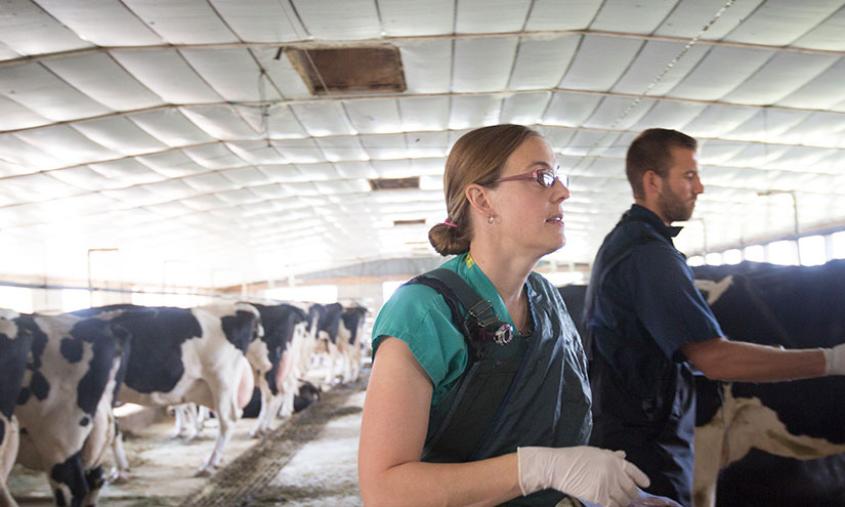CVM faculty win multiple Atkinson's Academic Venture Fund awards
The Atkinson Center for a Sustainable Future’s Academic Venture Fund awarded $1.8 million in 2017, with a record 15 grants to seed novel approaches to some of the world’s greatest sustainability challenges.
Several Atkinson teams are exploring new ways to promote planetary health for the well-being of humans, animals and ecosystems. Cornell’s new Master of Public Health (MPH) – an interdisciplinary degree program begun in fall 2017 – is co-sponsoring three projects, thanks to a gift from David Atkinson.
Atkinson research teams will work for New York state, finding ways to remediate lakes with legacy pollutants, helping dairy and cattle farmers reduce antibiotic use while protecting their livelihoods, and improving rural resilience as solar development comes to farming communities. Two teams will refine Cornell’s Earth Source Heat technology, which aims to bring clean geothermal heat to the Ithaca campus by 2035.
In support of Engaged Cornell, Atkinson is promoting undergraduate contributions to AVF research. Project teams involved with community-engaged research can apply for $10,000 of student research funding through the Office of Engagement Initiatives.
CVM faculty projects include:
Analyzing Antibiotic Use in Animal Agriculture: Antibiotic resistance is a global public health threat – but regulations intended to reduce antimicrobial use in food animals could undercut the economic viability of animal agriculture and many related industries. This project aims to inform policymakers by analyzing the impacts of strategies for controlling bacterial resistance by looking at the entire food system, from production to processing, transport and consumption. The researchers will develop a sustainable model for antimicrobial use that protects human and animal health and also livelihoods. Co-sponsored by MPH.
Investigators: Yrjo Grohn, population medicine and diagnostic sciences; Donald Kenkel, policy analysis and management; Lori Leonard, development sociology.
Sustainable Yield for Colombian Cows: In the developing world, family income and food security rise with dairy production. Facing climate change, disease and low-quality forage, South American dairy farmers often expand their businesses by raising more animals on more land. This team will help dairy farmers in Colombia sustainably by increasing the yield of each cow. The project will identify risk factors for metabolic diseases that limit milk production during early lactation, develop farm management strategies and introduce new technologies for disease control.
Investigators: Jessica McArt, population medicine and diagnostic sciences; Miguel Gómez, Cornell SC Johnson College of Business, Dyson; Thomas Overton, animal science.
 Wildlife-Friendly Beef: Vast fences in southern Africa separate cattle from wildlife that can carry foot-and-mouth disease, impeding key species migration routes. A new approach to keeping beef virus-free for international sale that does not completely depend on fences could open global markets for farmers, enhancing livelihood opportunities from agriculture and sustainable ecotourism. Working with partners in Botswana, this team will pilot test new guidelines for biosafety in beef production that rely on practical risk-mitigation steps, instead of habitat-disrupting fences.
Wildlife-Friendly Beef: Vast fences in southern Africa separate cattle from wildlife that can carry foot-and-mouth disease, impeding key species migration routes. A new approach to keeping beef virus-free for international sale that does not completely depend on fences could open global markets for farmers, enhancing livelihood opportunities from agriculture and sustainable ecotourism. Working with partners in Botswana, this team will pilot test new guidelines for biosafety in beef production that rely on practical risk-mitigation steps, instead of habitat-disrupting fences.
Investigators: Steven Osofsky, population medicine and diagnostic sciences; Shirley Atkinson, population medicine and diagnostic sciences; Randy Worobo, food science.
 No Fish Tale: Feed of the Future: World demand for seafood is rising as wild fish stocks decline, creating an urgent need for new sources of protein to grow fish. The researchers are developing a process for converting the aquaculture industry’s wastes into protein-rich feed. The technique acid-preserves offal from seafood processing facilities and solidifies it, creating a sustainable feed directly out of fishery byproducts. The new feed system could eventually replace fishmeal, reducing the aquaculture industry’s feed costs and carbon footprint.
No Fish Tale: Feed of the Future: World demand for seafood is rising as wild fish stocks decline, creating an urgent need for new sources of protein to grow fish. The researchers are developing a process for converting the aquaculture industry’s wastes into protein-rich feed. The technique acid-preserves offal from seafood processing facilities and solidifies it, creating a sustainable feed directly out of fishery byproducts. The new feed system could eventually replace fishmeal, reducing the aquaculture industry’s feed costs and carbon footprint.
Investigators: Eugene Won, animal science; Joe Regenstein, food science; Helene Marquis, microbiology and immunology.
(an extended version of this article first appeared in the Cornell Chronicle.)





